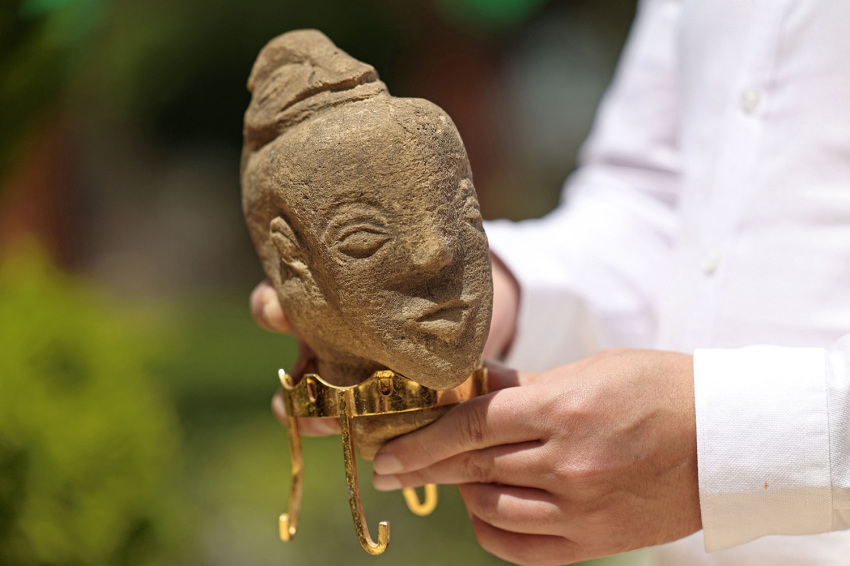Palestinian farmer discovers artifact linked to Canaanites from the Bible's Old Testament

A Palestinian farmer has discovered the head of a 4,500-year-old statue of Anat, an idol of the ancient people God ordered the Israelites to drive out of the Promised Land for breaking His commandments and worshiping false gods.
The limestone statue is about 8 inches tall and carved into the head is a face wearing a serpent as a crown. Anat was an idol of the Canaanites, a group of people God ordered driven out of Israel in the Old Testament.
The Hamas-run Ministry of Tourism and Antiquities announced the head’s discovery during a press conference in Gaza on Tuesday. The New Arab reported that Jamal Abu Rida, the ministry’s director-general of Antiquities and Cultural Heritage, estimated that the statue dates back to 2,500 B.C.
“Anat was the goddess of love, beauty and war in the Canaanite mythology,” Abu Rida said.
Abu Rida argued that the statue made a political point, stating that its “presence” disproves “the Zionist claim that the land of Palestine is a land without a people for a people without a land.” He also maintained that the farmer who made the discovery, Nidal Abu Eid, found the artifact on Monday in the al-Qarara town of Khan Younis.
“I found it by chance when I was cultivating my land. It was muddy but when I washed it with water, I realized that it is a precious thing, Abu Eid told The New Arab.
The farmer initially considered selling the goddess statue but changed his mind when an archaeologist informed him of its “great archaeological value.”
“I am so proud that our land still has great archaeological values,” Abu Eid added. “It means that this land is ours and we have a civilization and history for thousands of years B.C. since the Canaanite times.”
As the BBC reported, the Anat statue is on display in one of Gaza’s few museums in Qasr al-Basha. Due to increasing tensions between Israel and the Hamas-occupied territory, many Gazans are reportedly making sarcastic comments on social media about how the discovery of a goddess associated with war seems fitting.
Hamas is a military terrorist group that seized control of Gaza after Israel withdrew from it in 2005. Archaeological finds in Gaza have reportedly not been handled well in the past due to the group’s development of the land. As The Times of Israel reported in 2017, Hamas destroyed the remains of the Canaanite town of Tel es-Sakan to construct houses and military bases.
At the time, Abu Rida said the Canaanite city’s destruction was “disastrous for the archaeology and cultural heritage in Palestine.”
According to the Bible Project, the Canaanites occupied Israel, the land God had promised to Abraham. They were descendants of Canaan, the grandson of Noah, who was cursed for his father’s sin against Noah in Genesis 9:20-25.
The Canaanites angered the Lord by worshiping idols and sacrificing children to their false gods. These actions violate the first and second of God’s Ten Commandments, which declare “You shall have no other Gods before me” and “You shall not make for yourself a carved image, or any likeness of anything that is in heaven above, or that is in the earth beneath, or that is in the water under the earth,” respectively.
After Moses led the Jewish people out of Egypt, Joshua assumed leadership of the Israelites, according to Bible Project. God entrusted Joshua with the role of taking His people to Canaan and retaking the land of Israel.
God tells the Israelites in Deuteronomy 9:5 that “It is not because of your righteousness or your integrity that you are going in to take possession of their land; but on account of the wickedness of these nations, the Lord your God will drive them out before you, to accomplish what he swore to your fathers, to Abraham, Isaac and Jacob.”
He also warned the Israelites not to let themselves be influenced by the Canaanites and the culture that endorsed their practices. Instead, they were to cleanse the land of such wickedness and fulfill God’s promise in Genesis 12 to make Abraham and his descendants a “great nation.”



























